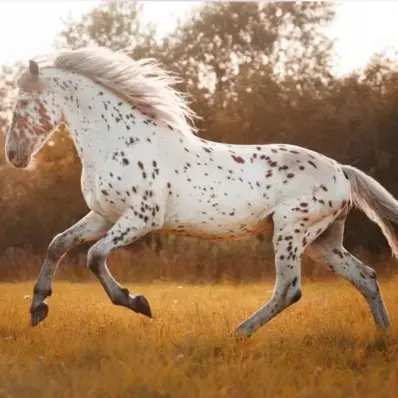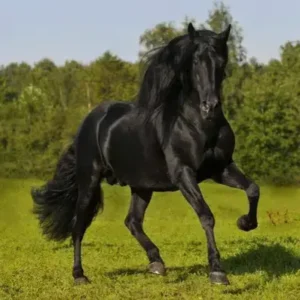History/Origin
The Appaloosa horse traces its roots to the Nez Perce tribe in the Pacific Northwest. Originally named after the Palouse River, they were known as the Palouse horse.
Bred by the Nez Perce, Appaloosas became essential to tribal life, prized for their endurance and versatility in hunting, herding, and transportation.
However, the history of the Appaloosa took a tragic turn in the late 19th century. As European settlers encroached upon the Nez Perce territory, conflicts arose, leading to the Nez Perce War of 1877. During this challenging time, many Appaloosas were scattered, lost, or even intentionally destroyed as a means of cultural suppression.
Despite these challenges, preservation efforts in the early 20th century, including the establishment of the Appaloosa Horse Club (ApHC) in 1938, helped revive and promote the breed.
Today, the Appaloosa stands as a resilient symbol of its Native American heritage. It has a rich history that reflects its role in the Nez Perce culture. The breed has an enduring legacy as a cherished and versatile horse breed globally.
Personality
The Appaloosa horse is an intelligent, brave, and independent breed. They are playful and mischievous, especially with inexperienced riders, so they need to be handled with care.
They are generally trustworthy, but mistreatment may lead to aggression, so it’s important to be gentle with them. Appaloosas are good at various activities such as working cattle, racing, dressage, and jumping competitions.
They are playful and sociable, and they form strong bonds with their human companions. They thrive in environments with enough space, so the lack of it may lead to temperamental behavior. These versatile horses excel in various activities, including trail riding. Their wide range of body types reflects their adaptability, making them suitable for different equestrian disciplines.
To manage the distinct personalities of Appaloosas, it’s important to understand their energy levels and provide sufficient space for a laidback and gentle temperament.
Physical Appearance
Appaloosas, often referred to as “spotted horses,” stand out among American horse breeds due to their unique coat patterns.
These patterns include spots, blankets, and roans, resulting in a visually striking appearance. What truly sets them apart is their distinctive white sclera—the visible white part of their eyes—which enhances their gaze.
Mottled skin around the eyes is another common characteristic, adding to their allure. Additionally, the coat’s base color can vary widely, creating a captivating mosaic of colors.
Notably, Appaloosas often have striped hooves, further contributing to their overall visual appeal. In essence, these remarkable horses embody both beauty and versatility in the world of equines.
Gender Differences
Usually, there are no notable differences between a male and female Appaloosa horse other than that of size. A male Appaloosa might be slightly bigger and have a more muscular appearance than the female.
There are also no notable differences between their color patterns or behavioral traits.
Feed/Nutrition
Appaloosa horses are known for their easy-to-maintain condition, but it’s important to keep in mind that their metabolism can vary based on bloodlines.
A balanced and nutritious diet is crucial for their well-being. Appaloosas thrive on a forage-based diet, with high-quality hay being the most important component.
Grains can be added to the diet, and fresh water should be provided consistently. For mature Appaloosas engaged in light work with a normal body condition, specific feeding recommendations come into play.
Addressing energy, protein, and nutrient requirements is vital to support their activity levels and overall health. Appropriate supplements may be introduced based on individual needs, ensuring a comprehensive and tailored approach to their nutritional well-being.
Tailoring nutrition to meet the specific needs of each horse contributes to their overall health, energy levels, and vitality.
Health
Appaloosas are generally hardy, but like any breed, they may be prone to certain health issues such as:
- Congenital Stationary Night Blindness (CSNB): CSNB is a hereditary condition in Appaloosa horses, causing impaired vision in low-light conditions. Affected horses may struggle in dim or dark environments, necessitating special considerations for their safety and well-being.
- Equine Recurrent Uveitis (ERU): ERU, or Moon Blindness, is a recurring inflammatory eye condition in Appaloosas. Episodes of eye inflammation can lead to discomfort, tearing, and light sensitivity. Timely veterinary intervention is crucial to manage ERU and prevent permanent eye damage.
- Hyperkalemic Periodic Paralysis (HYPP): HYPP is a genetic disorder found in some Appaloosas, causing episodes of muscle tremors, weakness, and paralysis due to potassium regulation abnormalities. Careful dietary management and stress reduction, guided by veterinary advice, are essential to minimize the frequency and severity of HYPP episodes.
Regular veterinary check-ups are essential.
Care and Grooming
Like all horses, maintaining cleanliness is crucial, especially before tacking up, to prevent skin irritation from dirt and debris.
- Grooming
Appaloosas have thin manes and tails, requiring daily grooming to avoid hair breakage. These horses usually shed more in the spring season. Other than that, the hair on their body is quite short and doesn’t require extensive grooming.
Regular shoe cleaning is also essential to ensure their well-being.
- Housing
Appaloosas are low-maintenance and adaptable, comfortable in various living conditions such as stabling with pasture access or continuous outdoor living with proper shelter. Blanketing is recommended in extreme weather for their well-being.
- Exercise
While regular exercise is beneficial for Appaloosas’ physical and mental health, their amiable temperament allows for flexibility in riding schedules. Horses kept in stalls should have regular opportunities to move and prevent stiffness.
Rescue Groups
Several rescue organizations specialize in the rehabilitation and rehoming of Appaloosas. Consider adopting from these groups to give a horse in need a loving home.
Breed for Sale
Interesting Facts
- The Appaloosa was named the state horse of Idaho in 1975.
- Knobby, born in 1918, is celebrated as a foundation sire for the Appaloosa breed. His herd’s escape from government confiscation made him a key contributor to the breed’s foundation stock.
Best For
Appaloosas excel in a variety of disciplines, making them suitable for both beginner riders and those interested in trail riding, show events, and pleasure riding.
Top Names
| Male Appaloosa Horse Names | Female Appaloosa Horse Names |
| Phoenix | Willow |
| Maverick | Starlight |
| Blaze | Ember |
| Rio | Savannah |
| Atlas | Pearl |










